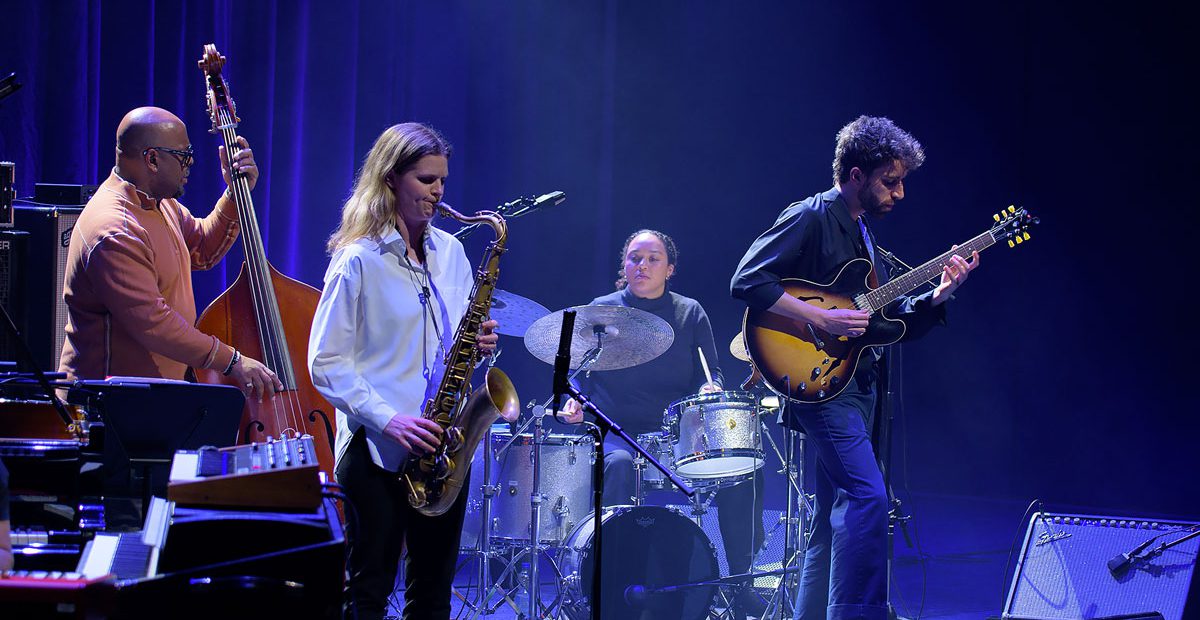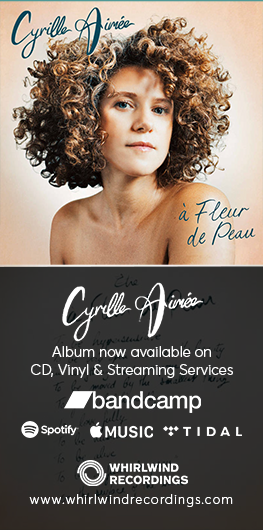A freak late snowstorm kicked off April Jazz for the first time in its 37-year history, which even included an October edition during the pandemic. By the time the nine-day festival wrapped up on April 27, the tall glass windows of the Espoo Cultural Centre in Tapiola were bathed in warm spring sun.
The first weekend’s highlight was a double bill of New Yorkers, starting with bassist Linda May Han Oh. The Malaysian-Australian Oh led a rich-textured quartet featuring two musicians from last year’s album, The Glass Hours: Portuguese vocalist Sara Serpa and Cuban pianist Fabian Almazan, who also happens to be her husband and indie-label boss. Rounding out the cosmopolitan team was Louisiana drummer Mark Whitfield, Jr.
The main focus was on Serpa’s unusual, mostly wordless vocals, her vocalise flitting like a spring bird from the first tune, a new piece called “Halo” that almost verged on bossa nova. Serpa’s singing can be stagey and theatrical, like Norma Winstone or Esperanza Spalding, while her poetry recitation on “Antiquity” sounded a bit contrived.
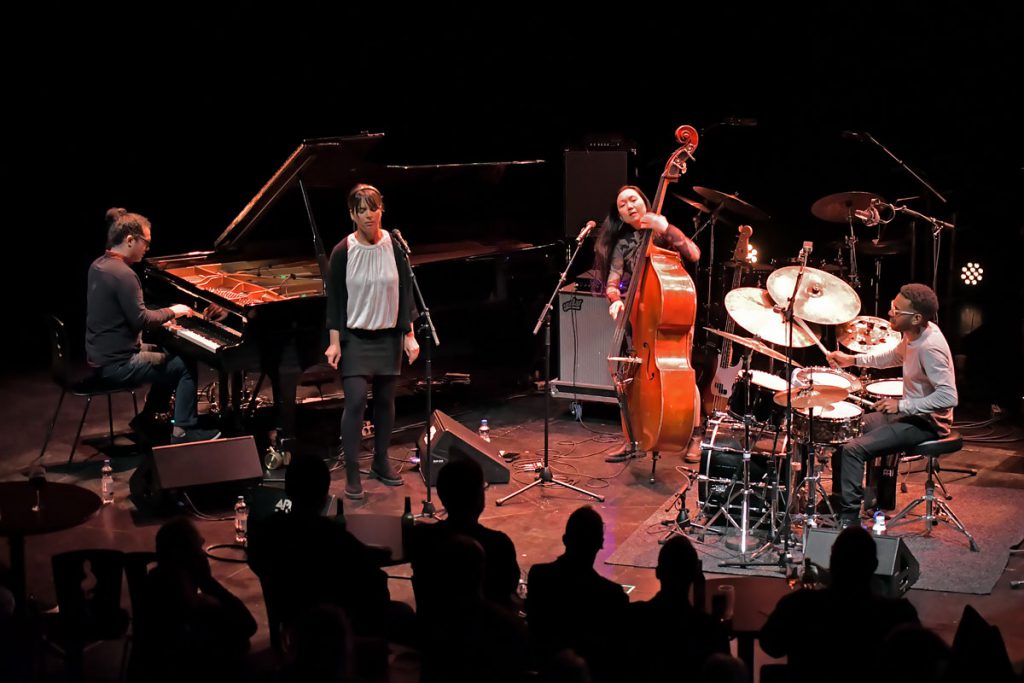
Almazan ranged freely across the whole keyboard with a light touch, momentarily wending into boogie-woogie. Later he added an eerie electronic effect that was evocative and ghostly at first but became gimmicky and boring.
Whitfield played a supporting role, creeping into one tune with hissing, slithering cymbals and finally letting loose on the encore with Almazan comping on piano.
Oh backed Serpa up at times with her deeper voice, and strongly led the whole band from her standup bass. She created spidery melodic structures, sometimes adding a bit of pedal steel-like twang. She switched to electric for the last tune, the sprightly “Chimera,” dedicated to her and Almazan’s three-year-old son. Anyone who says bass solos are boring hasn’t heard LMHO.
Immanuel Wilkins with the Espoo Big Band
Next up was alto saxophonist Immanuel Wilkins, 26, who’s collected a raft of awards for his two Blue Note albums. Here he was in an unfamiliar position as guest soloist with the festival’s ‘house band,’ the all-male Espoo Big Band.
They played a set of standards, mostly in time-honoured settings by American arrangers, starting with Thad Jones’ “All of Me” and Bob Brookmeyer’s tender arrangement of “Skylark,” both from the Vanguard Jazz Orchestra songbook.
Wilkins revealed a new side of his playing, playing these warhorses precisely and reverently with a warm, burnished tone.
He offered more of an extended improvisation on Bill Holman’s “Just Friends,” with pianist Aki Rissanen responding eloquently before a rather noisy, over-the-top ending from the orchestra. Rissanen was also good on Holman’s quirky arrangement of “Straight, No Chaser.” Though Rissanen isn’t usually a Monkish pianist, he did capture the “melodious thunk.”
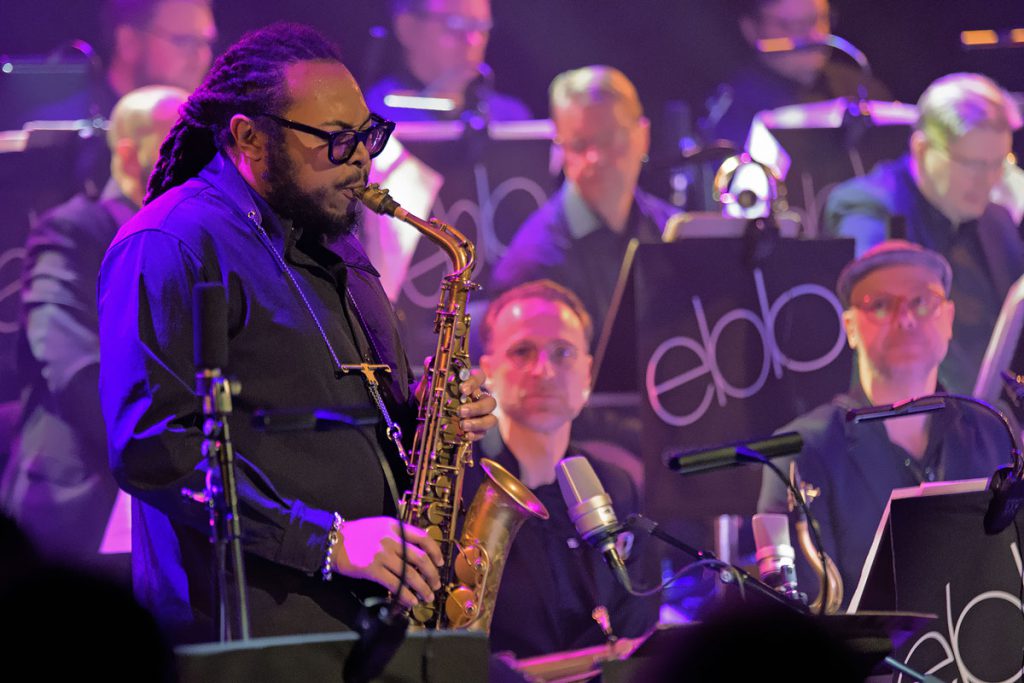
The best moments were Wilkins’ unbelievably fluid, floral solo on Duke Ellington’s “Isfahan,” and an arrangement of Coltrane’s “Equinox” by local sax great Eero Koivistoinen. That bluesy take started out as stealthy as “The Pink Panther” and featured a captivating, conversational baritone sax solo by Mikko Innanen, who got a bit skronky at the end.
Behind them all was the nimble EBB, led by conductor Marzi Nyman, who has a deep sense of rhythm. Despite its size, the band “swings like a moose,” as the Finns say.
Wilkins closed with two more standards, “Celia” and “Body & Soul,” backed by just a quartet, backing him like a subdued version of his own band and allowing him more flexibility than with the whole orchestra, though.
Christian McBride & Ursa Major
A week later in a larger concert hall upstairs, bassist Christian McBride led his “New Quintet” – which is actually more than two years old and called Ursa Major. The band had clearly gelled at the end of a European tour and just before a week-long engagement at the Blue Note in New York.
McBride calls this his “first all-millennial band,” with Israeli guitarist Ely Perlman about Wilkins’ age and the others close to 30. Being picked by McBride is a serious career step for all of them, and they all seemed to be trying to make the most of the showcase. The four younger players were all super-serious, without the jolly back-slapping camaraderie of Inside Straight, the band of male peers that McBride last brought here for the Savoy Jazzfest two years ago.
That festival also included Oh with pianist Vijay Iyer, as well as the all-female Artemis featuring this new band’s saxophonist: Nicole Glover. With drummer Savannah Harris and keyboardist Mike King, this was another interestingly diverse line-up, with Glover and King both alumni of Dee Dee Bridgewater’s band.
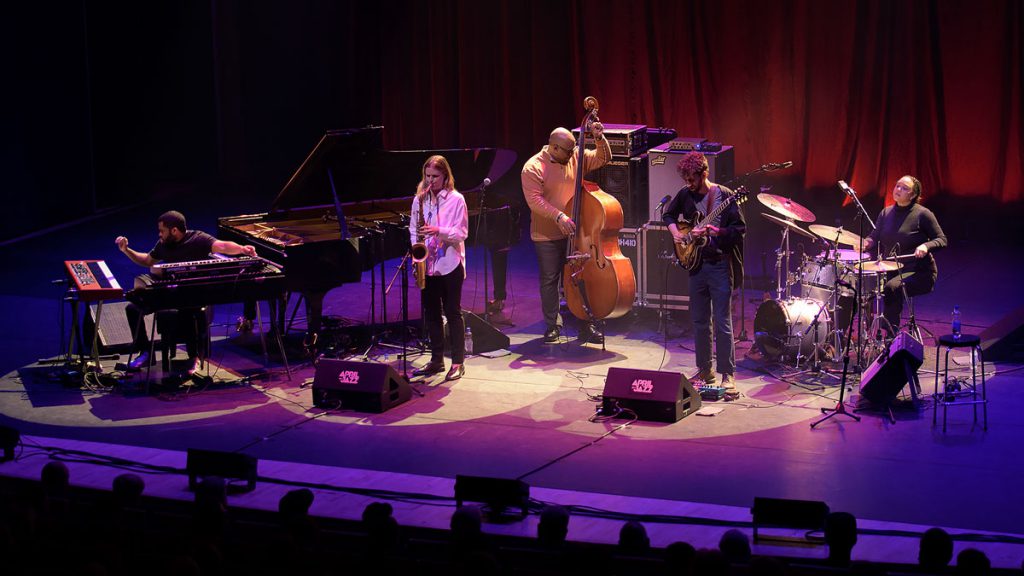
At one point, the drummer and electric organist played a nice dubby duet part that sounded a bit like London’s Alfa Mist. Later King switched to the grand piano, gushing like a stream in spring flood.
McBride mostly played a genial supportive role, while adding a few exquisite solos in his celebrated warm tone, adding percussion by tapping the body of his upright.
He hasn’t yet recorded with this line-up, and there were no tunes from his three recent albums, but there were originals by most of the band members. Those included Perlman’s tune, “Elevation,” on which he played some dazzling Robert Fripp-like looping and effects that were more interesting than the slick Kurt Rosenwinkel/John Scofield style he played otherwise.
Drummer Harris was relaxed and slow burning, understated but powerful when needed as on the “Giant Steps”-like “Familiar Steps.” Her own piece “More Is” was subtle, downbeat and moody with sad, lovely melody played by Glover.
Like Oh, McBride switched to electric bass guitar toward the end of the set, punching out a very funky solo on his rollicking new tune, “Brouhaha” and a funky soul-jazz encore that sounded like a lost 1960s Blue Note single.
Photos courtesy of Haappix
Last modified: May 8, 2024


